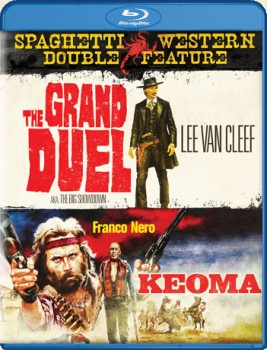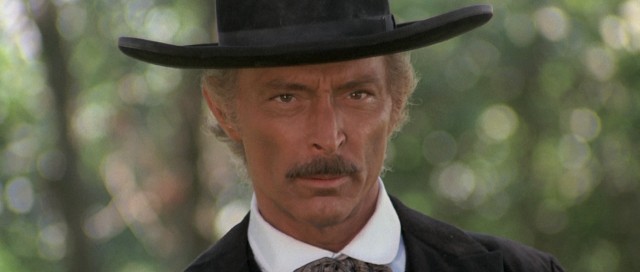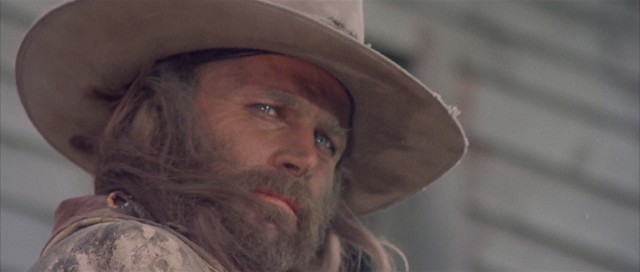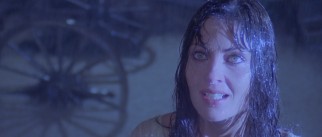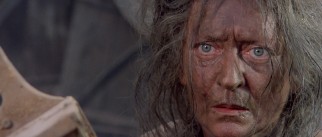The Grand Duel & Keoma: Spaghetti Western Double Feature Blu-ray Review
Buy The Grand Duel & Keoma Double Feature Blu-ray from Amazon.com
Spaghetti westerns peaked in popularity at the end of the 1960s with Sergio Leone's cross-Atlantic hit trilogy of Clint Eastwood films and Once Upon a Time in the West. The genre, however, remained active in Italy well into the '70s, keeping American actors like Lee Van Cleef gainfully employed.
Van Cleef's film career began with a part in the classic Hollywood western High Noon (1952) and he became a fixture in the genre as a heavy. Though many of the titles (which always clearly indicated the genre) no longer ring bells, Over in Italy, after taking a second hiatus from Hollywood, Van Cleef scored the role of a lifetime as Sentenza, a.k.a. Angel Eyes, The Bad in Leone's The Good, The Bad and The Ugly. After that, multilingual European productions held obvious appeal for Van Cleef, who then could single-handedly headline works like Death Rides a Horse and two-thirds of The Sabata Trilogy. Though he still received the occasional American film role (among them, the lead in The Magnificent Seven Ride! and a supporting role in John Carpenter's cult classic Escape from New York), the actor did much of his work with international casts in Italy.
Among Van Cleef's '70s spaghetti westerns was a film that has held different titles in different places and times. This Blu-ray debut declares it The Grand Duel with an "AKA The Big Showdown" under it. The latter title is featured on the disc's very menu and in the film's credits. On Wikipedia, you'll find it listed as Storm Rider.
Whatever you want to call it, this 1972 film was a vehicle tailor-made for Van Cleef by a couple of Leone colleagues: screenwriter Ernesto Gastaldi, best known for scripting the western comedy My Name is Nobody and its loose sequel, and first-time director Giancarlo Santi, Leone's AD on The Good, The Bad... and Once Upon a Time in the West and his vetoed choice to replace a fired Peter Bogdanovich at the helm of Duck, You Sucker!.
True to type, Van Cleef plays Clayton, a laconic, gun-slinging sheriff of a town called Jefferson who refuses to turn in his badge. Clayton is determined to find justice for Philipp Wermeer (Peter O'Brien), an innocent young man accused of murdering Ebenezer Saxon, the patriarch of nearby Saxon City. The seasoned Clayton is positive that Wermeer has been framed for the crime, although he's not yet sharing how he knows that with the restless Wermeer or anyone else asking.
With a $3,000 bounty out on Wermeer, the two men make their way to Saxon City to clear things up with Old Man Saxon's three sons, who are now running the town in a typically corrupt fashion: new patriarch David (Horst Frank), sheriff Eli (Marc Mazza), and poxy, gay, white-suited Adam (Klaus Grunberg).
Even if you're watching this under the title Storm Rider, it is pretty clear where things are headed. The journey to the inevitable conclusion is a fun one, coasting on the utter badassery of the fearless Clayton, who always knows when something's going down. The film takes a while to get going, but when it does, it is enjoyable, as it repeatedly revisits the questioned turn-of-the-century murder in black and white and indulges in some random, not always clear shootouts along the way.
The Grand Duel/The Big Showdown/Storm Rider/Il Grande Duello (its original Italian moniker) makes up half of Mill Creek Entertainment's recent Spaghetti Western Double Feature Blu-ray Disc. The second movie is only called Keoma here, although IMDb and Wikipedia make note that this 1976 film has also been titled Django Rides Again, Django's Great Return, Desperado, and The Violent Breed at various times. Two of those titles represent an effort to paint this as a sequel to 1966's Django, star Franco Nero's biggest hit in the genre, although it is clearly unrelated to that film in narrative.
Nero plays the title role, a shaggy, blue-eyed half-breed who is searching for himself in the wake of the Civil War. Keoma saves a freshly-widowed, very pregnant woman (Olga Karlatos) who is feared to carry a deadly plague. Her corrupt town isn't treating the victims of the disease, traced to polluted wells, nor are they allowing anyone to leave town alive. This does not sit well with Caldwell (Donald O'Brien), the man calling the shots. Keoma's three half-brothers, who have tormented him since youth as sometimes slow-motion childhood flashbacks show, are not inclined to help him. Their father (William Berger), however, is. As is Keoma's avuncular old friend and hero, the half-Indian, half-black George (Woody Strode), whose archery skills have faded with alcoholism.
Not quite as invincible as Van Cleef's protagonist (but still the fastest draw around), Keoma fights his three half-brothers one at a time. Then, he, his father, and George take on Caldwell and his posse. The finale brings the brothers back for something resembling a hide and seek game to the death.
Keoma boasts some strong and compelling visuals, cleverly filling the wide 2.35:1 aspect ratio favored by the genre. (Writer/director Enzo G. Castellari has continued to work in Italy, as recently as helming 2010's Caribbean Basterds.) Less artful and more questionable is the film's prominent use of lyrical music by a pair of artists called Sybil and Guy, real names Susan Duncan Smith and Cesare De Natale. Internet searches reveal little about the singers. Smith sounds Irish, but is in fact English, while De Natale seems to have a French accent, although his name suggests Italian origin. Though they have a haunting, otherworldly presence and are somewhat agreeable on their own, the songs are not unlike the ones of literal music videos, their lyrics very on the nose and laughably functioning like a kind of musical narration. While these songs are mostly laid over silent long shots, they feel out of place at all times and you suspect you're missing pertinent information if you can't make out the lyrics in their most unusual voices.
In spite of that disarming design, Keoma has appeal. The hero has a number of Christlike qualities to him (although he is strangely quick to use a racial slur that others toss at George more readily). The outcast pregnant woman, meanwhile, is not entirely dissimilar from the Virgin Mary. And then what to make of the vague old woman (Gabriella Giaccobe), called The Witch in end credits, whom Keoma keeps seeing and consulting?
If you are not familiar with spaghetti westerns or other yesteryear Italian cinema, then you may find the lack of synchronicity between picture and sound jarring. The Italians did not record sound with the picture, so all the dialogue had to be added in later (which may have been necessary anyway, depending on foreign cast members' accents). This was not done with the great care and precision of today's ADR process, so the images and words are rarely in convincing unison. The issue is a lot more noticeable on The Grand Duel than Keoma, although even the latter is far from perfect.
One person who either already owns this Blu-ray or should is Quentin Tarantino. The geeky movie fan and video store clerk turned acclaimed director used The Grand Duel's title score on Kill Bill Vol. 1. That his next film is a spaghetti western titled Django Unchained and features Franco Nero suggests he is also a fan of the actor's work in the genre.
VIDEO and AUDIO
Unexpectedly, this Blu-ray treats both films to very clean and clear picture quality. Though they aren't especially old movies, they are spaghetti westerns which tend to age quickly due to modest production methods and the lack of regard their often public domain status yields. Then there is the fact that Mill Creek was a studio DVD buffs loved to hate for their overly crammed DVDs. Aside from the sync issue that dates back to the original release and the dated and clunky nature of those hasty dub sessions, the 2.0 DTS-HD master audio is satisfying. The dialogue is usually easy to understand and comes with as much weight and clarity as the recordings allow. Employing harmonicas and such, Grand Duel's music is reminiscent of Ennio Morricone, while I've already told you about Keoma's more contemporary sound, which includes a rock-ish score to go with its songs.
One certainly unfortunate thing is the lack of subtitles, which on a number of occasions would have been welcome. I suspect Mill Creek just does the best it can with the materials it inherits/acquires and it is anyone's guess where they got these from. (Grand Duel has been released to DVD by multiple studios, while Keoma's discontinued standard def discs came from Anchor Bay and then a small B-movie company called Blue Underground.)
BONUS FEATURES, MENUS, PACKAGING and DESIGN
Each movie is accompanied by an original theatrical trailer in grainy high definition far from the pleasing quality of the feature presentations. Calling it The Big Showdown, The Grand Duel's trailer (2:54) is plagued by blown-out colors, distorted and faded sound, and occasional misframing. Keoma's preview (3:44) looks and sounds better.
On both of its individual DVDs, Keoma had been joined by an audio commentary by director Enzo G. Castellari and journalist Waylon Wahl, The disc offers a comparable menu scheme for each film. Taking their cues from the trailers, they play clips with a scratchy, discolored look with music (and, in the case of The Grand Duel, sound bites) over them. Though the Blu-ray does not support bookmarks, it does manage to resume playback flawlessly if you left off in the middle of a film.
If you know Mill Creek from their unorthodox DVDs, then it bears mentioning that this is packaged in a standard side-snapped Blu-ray case. This one doesn't take advantage of case translucency the way that some of the studio's other discs have, but few customers will complain over the inspired use of original poster artwork.
CLOSING THOUGHTS
Providing good presentations at a very reasonable price (under $10), this disc is a no-brainer to spaghetti western fans collecting Blu-rays, but probably of little interest to anyone else. Neither of these films approaches the high quality of Leone's few spaghetti westerns, which are widely hailed as the genre's benchmarks. But they've got enough style, substance, shades of gray, and absurd stunts to merit seeing and contrasting with America's own more straightforward yarns of yore.
Buy The Grand Duel & Keoma Double Feature Blu-ray from Amazon.com
|
Related Reviews:
DVDizzy.com | DVD and Blu-ray Reviews | New and Upcoming DVD & Blu-ray Schedule | Upcoming Cover Art | Search This Site
DVDizzy.com Top Stories:
Lee Van Cleef: For a Few Dollars More • Escape from New York | Woody Strode: Once Upon a Time in the West • The Italian Collection
Franco Nero: Cars 2
Westerns: True Grit (2010) • Rango • Dead Man • Billy Two Hats • Tombstone • The Adventures of Bullwhip Griffin
New: Hondo • John Carter • Barbarella • New York Stories • Seeking Justice • Spider-Man • Ghost Rider: Spirit of Vengeance
1970s Cinema: The Last Hard Men & Sky Riders • ¡Alambrista! • Chinatown • Taxi Driver • Rocky • The Godfather
Text copyright 2012 DVDizzy.com. Images copyright 1972 Mount Street Film, Corona Filmproduktion, Terra-Filmkunst, Société Nouvelle de Cinématographie, 1976 Uranos Cinematografica
and 2012 Mill Creek Entertainment. Unauthorized reproduction prohibited.
